Facts about Baklava
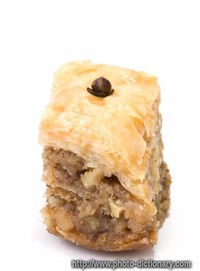
The word "baklava" entered English from Turkish, although the dish is often thought to be of Greek origin.

Baklava is generally served on special occasions, in many areas during religious ceremonies.

Gaziantep, a city in Turkey, is famous for its baklava and, in Turkey, is widely regarded as the native city of the dessert.
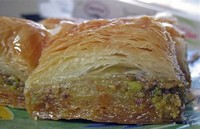
Sweet and exotic, baklava is cut into small pieces of various shapes (triangles, squares, or diamonds) and cooled before serving.

Blanched almonds are traditionally used in Rosh Hashannah baklava to produce a light color so that the year should be "sweet and bright.

In 2008, the Turkish patent office registered a geographical indication certificate for Antep Baklava.

The origin of baklava has continued to be disputed, since many ethnic groups claim this delicious, exotic dish as their own.

Baklava is basically layers of crisp phyllo dough (paper-thin sheets of raw, unleavened flour dough used for making pastries) alternated with a sugary spiced nut mixture, which includes walnuts, almonds, and possibly pistachios.

Commonly regarded as a Greek specialty, baklava is available in a wide range of local variations throughout Greece, both mainland and islands.
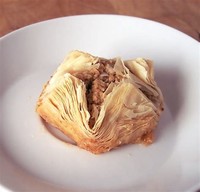
One of the oldest known recipes for a sort of proto-baklava is found in a Chinese cookbook written in 1330 under the Yuan (Mongol) dynasty under the name gьllach.
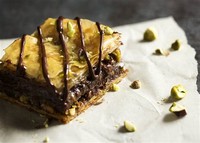
Baklava or baklawa is a rich, sweet pastry featured in many cuisines of the former Ottoman countries.

The Greek's major contribution to baklava was the creation of the dough technique that allowed it to be rolled as thin as a leaf, rather than the rougher, bread-like texture of the Assyrian dough.

Baklava is also cut into a variety of shapes for serving, although this very rich treat is always served in small portions.

Baklava is the most famous of the Greek pastries, and every area of Greece, and sometimes every family within a region, has a favorite recipe.

The history of baklava is not well-documented; but although it has been claimed by many ethnic groups, the best evidence is that it is of Central Asian Turkic origin.
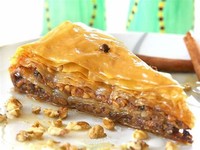
An ancient recipe from the Greek island of Crete for Gastrin (in Greek: ???????) is quite similar to modern baklava.

Baklava was chosen to represent Cyprus in the presentation Sweet Europe of the cultural initiative Cafй Europe in 2006.
The oldest (2nd century BCE) recipe that resembles a similar dessert is the honey covered baked layered-dough dessert placenta of Roman times, which Patrick Faas identifies as the origin of baklava: "The Greeks and the Turks still argue over which dishes were originally Greek and which Turkish.